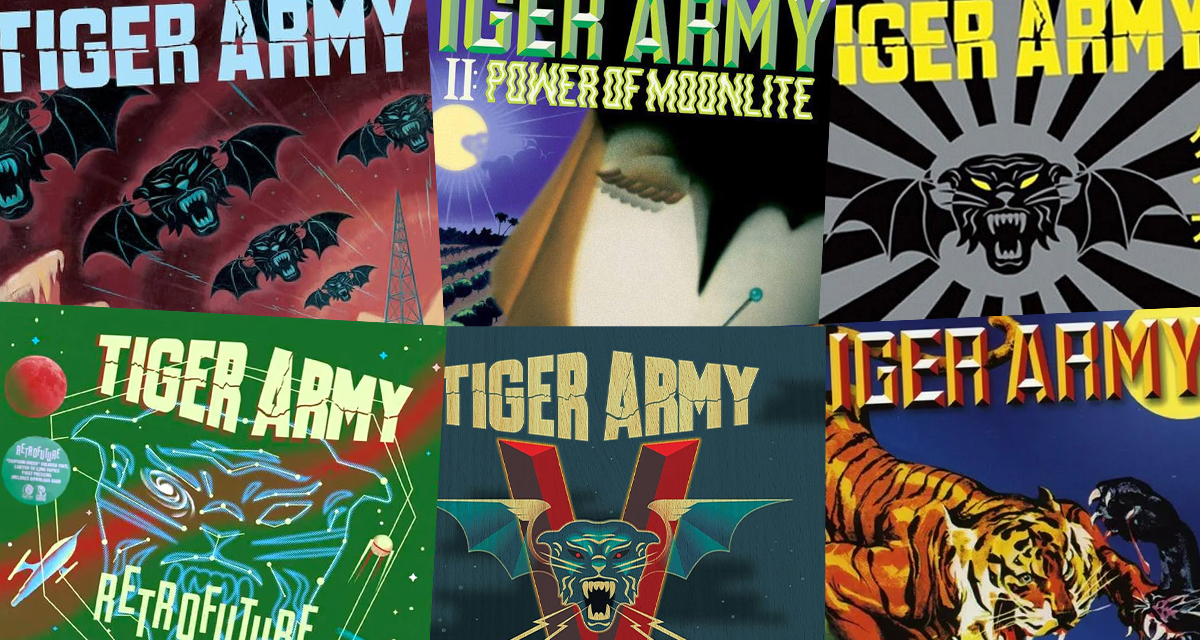Tiger Army is probably the most recognizable American psychobilly band. The genre’s “third wave” lines up well with the release of Tiger Army’s first album in 1999, and their rise in popularity over the following decade. (And yes, there are several alleged waves of psychobilly music, because labeling and debating music history is what music reviewers love most.) Whether they were confusing punk kids at the Warped Tour with their first psychobilly experience, or just confusing old-hat psychobilly fans by not singing with the genre’s default Scandinavian accent, Tiger Army brought their own unique blend of psychobilly and Americana to the early 2000s punk scene. This week, we tuned out the pompadoured shouting of several over-opinionated psychobilly fans long enough to rank Tiger Army’s entire catalog. After four hours of the upright bass’s CLACK-CLACK-CLACK drove us to madness, we made the following list of their albums ranked from worst to best:
Honorable Mention: Nick 13 “Self-Titled” (2011)
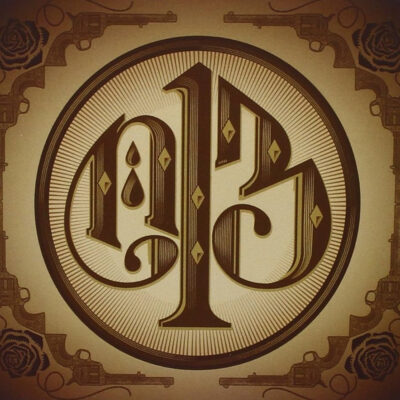 Yes, we know this is a country album and not technically released under the official Tiger Army brand. If you’re that bothered by it, scroll down a little and you’ll find the psychobilly reviews you’re so hungry for. The rest of us can appreciate that Tiger Army has always been heavily influenced by country/western music. Nick 13 dropped the decidedly un-psycho “Outlaw Heart” into his band’s first album, and it’s still their most popular song 25 years later. His solo project is not the twangy alt-country that hypes up crowds at the county fair. It’s a sincere and well polished collection of Americana by an artist who clearly knows and loves it. Tiger Army classics “Cupid’s Victim” and “In The Orchard” both get the country treatment here. The former sounds like one of those mashups where they change the genre of a song with AI. If you and your country-loving coworker can’t agree on what to play in the car while you drive him to work after the court took his license away, this is a decent compromise.
Yes, we know this is a country album and not technically released under the official Tiger Army brand. If you’re that bothered by it, scroll down a little and you’ll find the psychobilly reviews you’re so hungry for. The rest of us can appreciate that Tiger Army has always been heavily influenced by country/western music. Nick 13 dropped the decidedly un-psycho “Outlaw Heart” into his band’s first album, and it’s still their most popular song 25 years later. His solo project is not the twangy alt-country that hypes up crowds at the county fair. It’s a sincere and well polished collection of Americana by an artist who clearly knows and loves it. Tiger Army classics “Cupid’s Victim” and “In The Orchard” both get the country treatment here. The former sounds like one of those mashups where they change the genre of a song with AI. If you and your country-loving coworker can’t agree on what to play in the car while you drive him to work after the court took his license away, this is a decent compromise.
Play it again: “Carry My Body Down”
Skip it: If you’re not open-minded enough for a country album from a psychobilly vocalist, you’ll probably skip the whole thing. And that’s fine, you’re not its target audience.
6. Retrofuture (2019)
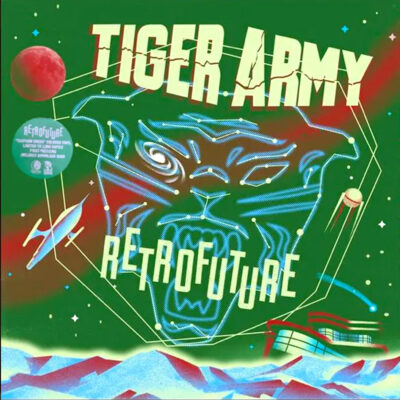 This was a tough one. “Retrofuture” is a wide-ranging sampler of genres. There’s some rock, Americana, a little psychobilly. There’s even a love ballad about the moon that’s entirely in Spanish. The songs all work. Nothing feels forced or like it was included just for the sake of adding another genre to the list. It all feels like a Tiger Army Album. But this showcase of Nick 13’s range is exactly what puts it last on this list. It is one of those albums that so clearly separates a band’s “new stuff” from their “old stuff”. If you’ve been a fan of Tiger Army since the beginning, this isn’t psychobilly enough to meet your expectations. And if you haven’t been a fan since the beginning, what made you start with their new album, in 2019? Overall, it’s good, but something has to be last on this list, and it honestly came down to semantics.
This was a tough one. “Retrofuture” is a wide-ranging sampler of genres. There’s some rock, Americana, a little psychobilly. There’s even a love ballad about the moon that’s entirely in Spanish. The songs all work. Nothing feels forced or like it was included just for the sake of adding another genre to the list. It all feels like a Tiger Army Album. But this showcase of Nick 13’s range is exactly what puts it last on this list. It is one of those albums that so clearly separates a band’s “new stuff” from their “old stuff”. If you’ve been a fan of Tiger Army since the beginning, this isn’t psychobilly enough to meet your expectations. And if you haven’t been a fan since the beginning, what made you start with their new album, in 2019? Overall, it’s good, but something has to be last on this list, and it honestly came down to semantics.
Play it again: “Last Ride”
Skip it: “Night Flower”
5. V •••– (2016)
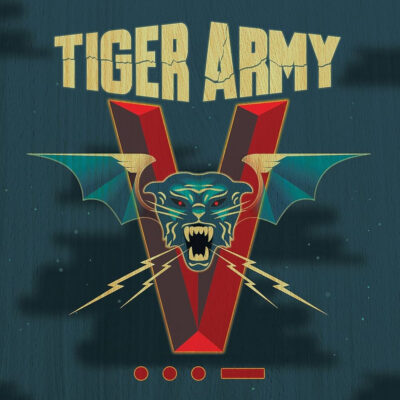 This is their fifth album. Its name is derived from the Roman numeral V, representing the number 5, and the corresponding morse code for the letter V, not the number 5, which would have been too logical. We ranked it 5th overall because this was confusing and also because their first four albums were better than this one. “V” has a more relaxed bluesy style than previous Tiger Army offerings, and way more piano. Neither of these take away from the quality of the album, but it’s not exactly what the cuffed-jeans-and-flat-top crowd gets excited about. Nick 13, with yet another brand new lineup, chose dark ominous tones more often than the dark ominous lyrics typical of his contemporaries. Tiger Army’s music is mostly free of the usual tropes about zombies, banging dead people, or just how awesome horror movies are in general, and “V” is no exception. Any talk of haunting is in reference to the dreams of a lover, not ghouls.
This is their fifth album. Its name is derived from the Roman numeral V, representing the number 5, and the corresponding morse code for the letter V, not the number 5, which would have been too logical. We ranked it 5th overall because this was confusing and also because their first four albums were better than this one. “V” has a more relaxed bluesy style than previous Tiger Army offerings, and way more piano. Neither of these take away from the quality of the album, but it’s not exactly what the cuffed-jeans-and-flat-top crowd gets excited about. Nick 13, with yet another brand new lineup, chose dark ominous tones more often than the dark ominous lyrics typical of his contemporaries. Tiger Army’s music is mostly free of the usual tropes about zombies, banging dead people, or just how awesome horror movies are in general, and “V” is no exception. Any talk of haunting is in reference to the dreams of a lover, not ghouls.
Play it again: “Firefall”
Skip it: “In The Morning Light”
4. Self-Titled (1999)
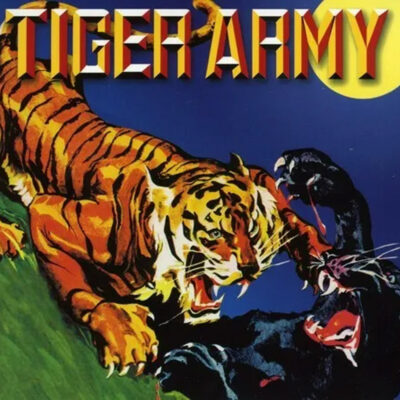 We could have just ranked these all in reverse chronological order. And there’s maybe a good argument to be made in favor of that. But that seemed too “their first album was better” of us, so we decided to nitpick production quality on these early ones. This self-titled debut goes hard from the beginning, with the clacking double bass intro on “Nocturnal” prepping us for a textbook example of late-1990s/early-2000s psychobilly. “Tiger Army” does a better job than most of using show-not-tell lyrics about fog and the night rather than gore and body horror to tell its story. The only real problem with this album comes about three or four songs in when you realize that double bass CLICK is not just a choice they made for the opening song, but rather the result of sound mixing that left it way too prominent in the final product. It’s distracting enough that this album gets knocked down several ranks for this alone.
We could have just ranked these all in reverse chronological order. And there’s maybe a good argument to be made in favor of that. But that seemed too “their first album was better” of us, so we decided to nitpick production quality on these early ones. This self-titled debut goes hard from the beginning, with the clacking double bass intro on “Nocturnal” prepping us for a textbook example of late-1990s/early-2000s psychobilly. “Tiger Army” does a better job than most of using show-not-tell lyrics about fog and the night rather than gore and body horror to tell its story. The only real problem with this album comes about three or four songs in when you realize that double bass CLICK is not just a choice they made for the opening song, but rather the result of sound mixing that left it way too prominent in the final product. It’s distracting enough that this album gets knocked down several ranks for this alone.
Play it again: “Outlaw Heart”
Skip it: “Devil Girl”
3. Music From Regions Beyond (2007)
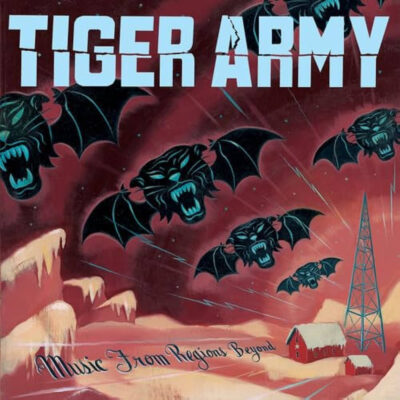 This was the first album Tiger Army released since their debut that didn’t have Roman numerals in its name. It was at the time the cleanest sounding record they had released. It lives in the uncanny valley between their faster early albums and Nick 13’s more experimental later work with its lengthy love ballads and Spanish guitar. This fourth album meant a fourth personnel change as well. Nick 13 is the only remaining member of Tiger Army’s original lineup. It’s impressive that they kept a fairly consistent style through these first few albums, but that goes to show how much this band has always just been singer/songwriter/guitarist Nick 13 with a rotating assortment of backing musicians on bass and drums. “Regions Beyond” continued the trend started by “Ghost Tigers” of Tiger Army getting more mellow with age. It’s not entirely without punk energy – there are a few screamo bits in “Hotprowl,” for example – but this album lacks the energy of their earlier work.
This was the first album Tiger Army released since their debut that didn’t have Roman numerals in its name. It was at the time the cleanest sounding record they had released. It lives in the uncanny valley between their faster early albums and Nick 13’s more experimental later work with its lengthy love ballads and Spanish guitar. This fourth album meant a fourth personnel change as well. Nick 13 is the only remaining member of Tiger Army’s original lineup. It’s impressive that they kept a fairly consistent style through these first few albums, but that goes to show how much this band has always just been singer/songwriter/guitarist Nick 13 with a rotating assortment of backing musicians on bass and drums. “Regions Beyond” continued the trend started by “Ghost Tigers” of Tiger Army getting more mellow with age. It’s not entirely without punk energy – there are a few screamo bits in “Hotprowl,” for example – but this album lacks the energy of their earlier work.
Play it again: “Forever Fades Away”
Skip it: “Hechizo De Amor”
2. Tiger Army III: Ghost Tigers Rise (2004)
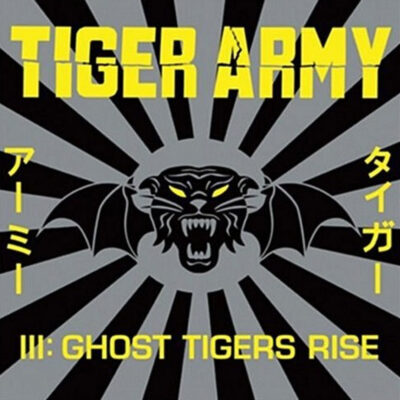 Do you hear it? That click is back. What’s with the ever-changing sound levels between each of these first four records? “Power of Moonlight,” for example, has almost no detectable bass click. And the same person is credited on bass for both albums (a record at the time for any of the 7 current or former backing members of this 3-piece group) but each sounds completely different. It’s one of life’s great mysteries. Anyways, “Ghost Tigers” starts out as an indisputable psychobilly record before shifting gradually into a calmer, genre-bending jam session. We’re shown an Americana-influenced sound that focuses more than its predecessors on Nick 13’s soothing vocals. If you’re upset that this album wasn’t first on our list, you probably would have enjoyed Nick 13’s country album had you not skipped it when we tried to bring it up earlier. You should go back and listen to “Nick 13” before you read the next entry. We’ll wait for you.
Do you hear it? That click is back. What’s with the ever-changing sound levels between each of these first four records? “Power of Moonlight,” for example, has almost no detectable bass click. And the same person is credited on bass for both albums (a record at the time for any of the 7 current or former backing members of this 3-piece group) but each sounds completely different. It’s one of life’s great mysteries. Anyways, “Ghost Tigers” starts out as an indisputable psychobilly record before shifting gradually into a calmer, genre-bending jam session. We’re shown an Americana-influenced sound that focuses more than its predecessors on Nick 13’s soothing vocals. If you’re upset that this album wasn’t first on our list, you probably would have enjoyed Nick 13’s country album had you not skipped it when we tried to bring it up earlier. You should go back and listen to “Nick 13” before you read the next entry. We’ll wait for you.
Play it again: “Swift Silent Deadly”
Skip it: “The Long Road”
1. Tiger Army II: Power of Moonlight (2001)
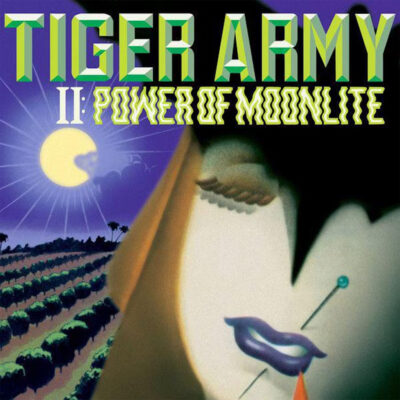 Welcome back. Does the steel guitar on “In The Orchard” make more sense now? Oh, you still didn’t listen to the country album? Of course you didn’t. More importantly, doesn’t this remind you of early AFI? It should, since it features loads of guest vocals from Davey Havok, as well as the bass support of AFI’s recently separated Geoff Kresge. If one of your friends suddenly started wearing creepers and a pompadour in 2002, “Power of Moonlight” is likely the album that got them into the psycho scene. It perfectly blends Nick 13’s punk roots with his affinity for any style that can be played on an upright bass. At a punk-appropriate runtime of 13 tracks and under 40 minutes, this album had no room for duds or filler. “When the Night Comes Down”, in particular, sets a high bar for future psychobilly acts to follow when they, too, write their scene-mandated songs about being in love with vampires.
Welcome back. Does the steel guitar on “In The Orchard” make more sense now? Oh, you still didn’t listen to the country album? Of course you didn’t. More importantly, doesn’t this remind you of early AFI? It should, since it features loads of guest vocals from Davey Havok, as well as the bass support of AFI’s recently separated Geoff Kresge. If one of your friends suddenly started wearing creepers and a pompadour in 2002, “Power of Moonlight” is likely the album that got them into the psycho scene. It perfectly blends Nick 13’s punk roots with his affinity for any style that can be played on an upright bass. At a punk-appropriate runtime of 13 tracks and under 40 minutes, this album had no room for duds or filler. “When the Night Comes Down”, in particular, sets a high bar for future psychobilly acts to follow when they, too, write their scene-mandated songs about being in love with vampires.
Play it again: This whole album. Repeat as necessary to achieve desired effect.
Skip it: Nothing. Just press play and enjoy the next 36 minutes.

